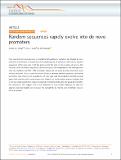Random sequences rapidly evolve into de novo promoters
Author(s)
Yona, Avihu H.; Alm, Eric J.; Gore, Jeff; Yona, Avihu; Alm, Eric J
Downloads41467-018-04026-w.pdf (1.219Mb)
PUBLISHER_CC
Publisher with Creative Commons License
Creative Commons Attribution
Terms of use
Metadata
Show full item recordAbstract
How new functions arise de novo is a fundamental question in evolution. We studied de novo evolution of promoters in Escherichia coli by replacing the lac promoter with various random sequences of the same size (∼100 bp) and evolving the cells in the presence of lactose. We find that ∼60% of random sequences can evolve expression comparable to the wild-type with only one mutation, and that ∼10% of random sequences can serve as active promoters even without evolution. Such a short mutational distance between random sequences and active promoters may improve the evolvability, yet may also lead to accidental promoters inside genes that interfere with normal expression. Indeed, our bioinformatic analyses indicate that E. coli was under selection to reduce accidental promoters inside genes by avoiding promoter-like sequences. We suggest that a low threshold for functionality balanced by selection against undesired targets can increase the evolvability by making new beneficial features more accessible.
Date issued
2018-04Department
Massachusetts Institute of Technology. Department of Biological Engineering; Massachusetts Institute of Technology. Department of PhysicsJournal
Nature Communications
Publisher
Nature Publishing Group
Citation
Yona, Avihu H. et al. “Random Sequences Rapidly Evolve into de Novo Promoters.” Nature Communications 9, 1 (April 2018): 1530 © 2018 The Author(s)
Version: Final published version
ISSN
2041-1723